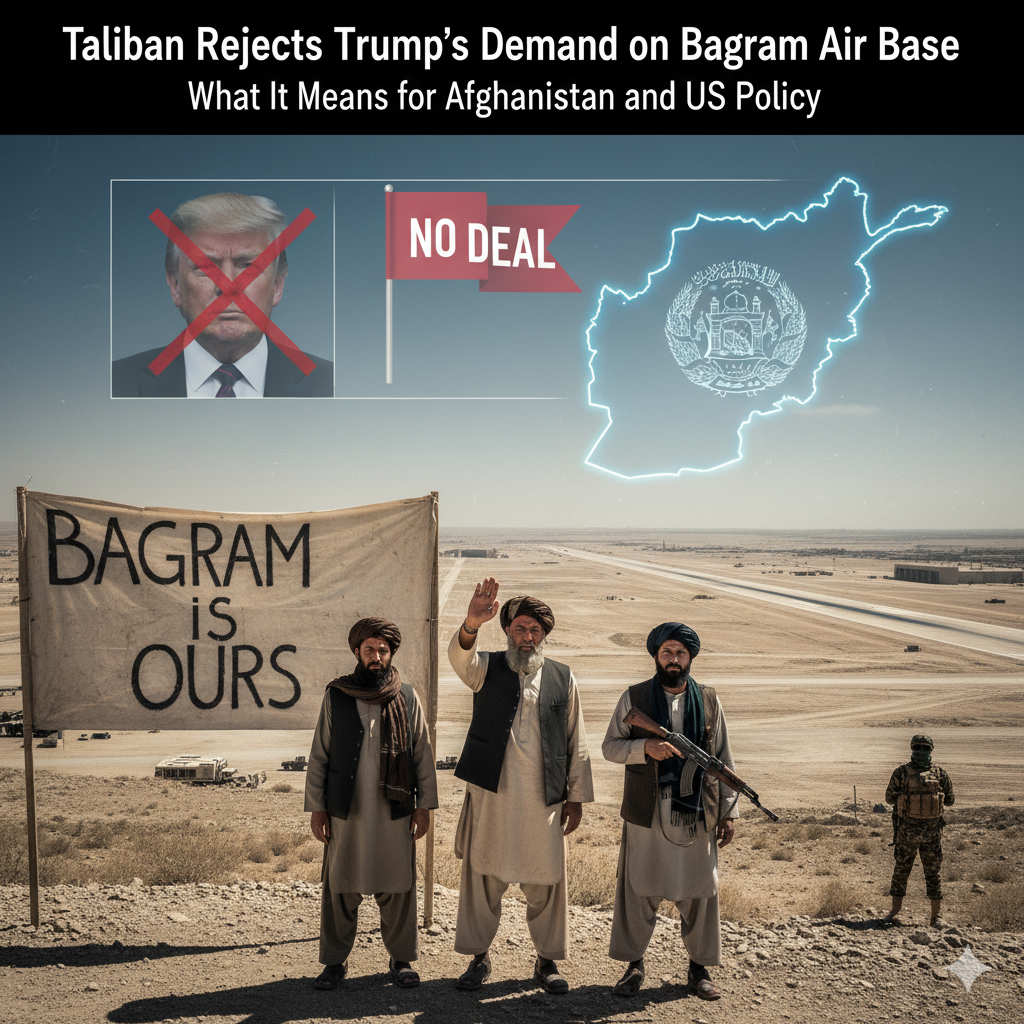Introduction: A Clash Over Bagram
In September 2025, Afghanistan once again found itself at the center of global headlines. The Taliban government in Kabul rejected former US President Donald Trump’s demand that Washington regain control of the Bagram air base, one of the most strategically important military installations in South and Central Asia. A Taliban spokesperson stated bluntly that such a deal was “not possible,” signaling Kabul’s intent to assert sovereignty in the face of mounting pressure from Washington.
This development underscores the deep rift between the US and Taliban-led Afghanistan, while raising broader questions about security, regional stability, and America’s diminishing influence in the region.
Bagram’s Strategic Importance
The Bagram air base, located 70 kilometers north of Kabul, is not just a military facility — it is a symbol of two decades of US intervention in Afghanistan. During the height of the war, the base housed over 30,000 US and NATO personnel, with infrastructure including two runways, massive hangars, intelligence facilities, and detention centers.
For the Pentagon, Bagram was a critical hub for counterterrorism operations, drone strikes, and logistics across South Asia and the Middle East. At its peak, the US invested billions of dollars into upgrading the base. Its abandonment in July 2021, during the chaotic American withdrawal, was widely viewed as a symbol of US retreat and the Taliban’s resurgence.
Regaining control of Bagram, even symbolically, would represent a reversal of fortune for Washington. For the Taliban, however, ceding it back would amount to relinquishing sovereignty and undermining their hard-won legitimacy.
Trump’s Position and Political Context
Donald Trump, who is once again a central figure in US politics, has sought to project a tough stance on Afghanistan. By demanding control of Bagram, Trump aims to highlight what he sees as President Joe Biden’s failed withdrawal strategy in 2021, which left Afghanistan in the Taliban’s hands.
Trump has repeatedly argued that retaining Bagram would have allowed the US to monitor China, Russia, and Iran more effectively. In campaign rallies and media appearances, he portrays the loss of the base as a strategic blunder that weakened American global influence.
His demand, however, is not just about Afghanistan — it plays into broader domestic narratives of strength, sovereignty, and reversing the perceived decline of American power.
Taliban’s Response: Sovereignty First
The Taliban’s rejection of Trump’s demand is consistent with their broader policy of asserting independence from foreign powers. Since their return to power in 2021, they have resisted calls for military cooperation with the US, even while facing growing security threats from groups such as the Islamic State Khorasan Province (ISKP).
A senior Taliban official stated, “Bagram belongs to Afghanistan. The time of foreign control is over. No deal is possible.” This reflects the Taliban’s determination to consolidate internal legitimacy by rejecting any foreign military footprint, which remains deeply unpopular among Afghans after decades of war.
Regional Implications: China, Russia, and Beyond
The Taliban’s decision carries broader regional consequences. Both China and Russia have expanded their diplomatic and economic ties with the Taliban government, seeking to stabilize Afghanistan for strategic and security reasons. Beijing, in particular, views Afghanistan as central to its Belt and Road Initiative (BRI), with plans for infrastructure projects and mining ventures.
A US return to Bagram would be perceived in Beijing and Moscow as a direct security challenge. For Pakistan, Iran, and Central Asian republics, the Taliban’s firm stance underscores a new geopolitical reality: Afghanistan is no longer an American stronghold but part of a shifting Eurasian balance of power.
Security Concerns: ISKP and Terrorism
Critics argue that rejecting US involvement could weaken Afghanistan’s ability to combat ISKP, which has carried out dozens of deadly attacks since 2021, including assaults on mosques, schools, and foreign embassies. According to UN reports, ISKP remains the biggest security challenge in Afghanistan, with its operations spreading into Pakistan, Iran, and Central Asia.
While the Taliban claim they can handle the threat independently, international experts remain skeptical. The absence of robust counterterrorism cooperation with the US and NATO may allow extremist networks more room to operate.
Humanitarian and Domestic Dimensions
The debate over Bagram also intersects with Afghanistan’s ongoing humanitarian crisis. Over 28 million Afghans are in need of humanitarian aid, according to the UN, while food insecurity affects nearly half the population. Many argue that renewed military tensions with Washington could further isolate Afghanistan and worsen its economic collapse.
Domestically, the Taliban use resistance to foreign demands as a rallying point. By rejecting Trump, they project strength to their base and silence critics who accuse them of being too accommodating to foreign interests.
US Options Moving Forward
For Washington, regaining influence in Afghanistan remains difficult. The Biden administration has largely disengaged, focusing instead on counterterrorism operations from outside Afghan territory. Trump’s rhetoric about Bagram highlights the frustration among American policymakers who see Afghanistan slipping further into the orbit of rival powers.
Options for the US remain limited. Without boots on the ground, it must rely on regional partners, satellite surveillance, and limited air operations. Re-establishing a presence at Bagram would require Taliban cooperation — something Kabul has clearly ruled out.
Conclusion: A Symbol of Shifting Power
The Taliban’s rejection of Donald Trump’s demand to return control of Bagram air base is more than a diplomatic spat. It represents the enduring legacy of America’s longest war, the rise of Taliban sovereignty, and the broader geopolitical shift away from US dominance in South Asia.
While Trump may continue to invoke Bagram as a symbol of American decline, the reality on the ground suggests otherwise: Afghanistan has firmly closed the door on foreign control. The real challenge now lies in whether the Taliban can deliver stability, combat terrorism, and manage relations with neighboring powers — without reigniting cycles of conflict.
In the end, the fate of Bagram reflects a simple truth. The age of foreign bases in Afghanistan is over. The question that remains is whether Afghanistan can survive the weight of its sovereignty in an increasingly turbulent region.







